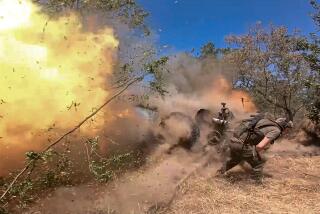With Crew’s Fate Determined, the Questions Are Only Starting
- Share via
MOSCOW — When divers finally pried open the hatch of the Kursk on Monday and discovered the submarine full of water, they raised anew perhaps the most painful question concerning the deep-sea disaster: Was it ever possible to rescue the crew?
The answer, in all probability, is no. Most of those aboard probably died within minutes of the blasts that ruptured the sub’s double hull and flooded the forward sections where they were stationed. Any survivors remaining toward the rear of the vessel probably died before even the speediest rescue team could have arrived.
But for most Russians, the questions won’t stop there.
The question troubling the country above all is this: Did Russian officials do everything possible to save the crew? And, judging by the vitriolic criticism directed toward the navy and the Kremlin, most Russians think the answer is no.
“Speaking honestly and frankly, we have to reach the following conclusion: The authorities acted as though everyone was already dead aboard the submarine,” wrote the Novaya Gazeta newspaper.
The post-mortems are likely to continue for months, if not years--on the bodies of the crew, on the hulk of the sub and on the decisions of those in charge.
Concerning the last of those topics, the questions are already myriad. Among them are these:
* When did naval officials learn something had gone wrong with the submarine?
Even though two explosions were heard about 11:30 a.m. on Saturday, Aug. 12, naval officials said they didn’t realize anything was amiss until nearly 12 hours later, when the submarine failed to make a scheduled radio contact. Did naval officials fail to notice signs of trouble during those 12 hours? Did they lose critical rescue time?
* Did they work first and foremost to save the crew? Or were they more concerned about the fate of the submarine, one of the most advanced in the Russian fleet?
When a diving bell first reached the crippled sub late Aug. 13 or sometime Aug. 14, it was used to survey and film the wreck. Was that necessary as a first stage in a lifesaving operation? Or was there more concern for the fate of the vessel than for the crew? These questions became greater after navy officials acknowledged that knocking signals from inside the ship indicated that the vessel was filling with water as the filming was taking place.
* Did Russian officials wait too long to accept Western offers of assistance?
As soon as the accident was reported Monday, Western governments offered to make rescue craft and diving teams available. However, it was only two days later that President Vladimir V. Putin ordered the navy to accept any and all assistance from the West.
Some British and Norwegian officials have said that they began preparations immediately upon learning of the disaster and could not have reached the accident site sooner even if an OK from the Kremlin had come earlier. The British would have taken 72 hours to reach the site, said Joanna Kidd, a naval analyst at the International Institute for Strategic Studies in London, so even if they had been called in the moment the Russian navy learned of the accident, they would have arrived after the knocking on the submarine ceased. However, it would have been close.
“It’s possible that some survived the initial explosions in the aft,” Kidd said. “It’s possible that they could have been saved if a rescue mission could have been mounted right away.”
* Did the Russians focus too much on the cause of the accident and not enough on the rescue?
Whatever other factors played a role in the Russians’ decision-making, it’s certain that they were hampered by a sense of disbelief. The Kursk, whose crew was honored this spring as the best in the fleet, was perhaps the navy’s top-of-the-line submarine. It was built to withstand a nuclear blast. The possibility that it could be sunk by a conventional explosion, either within its own torpedo bay or from a stray World War II mine, remains unthinkable to many Russians.
Typical was this reaction, from retired Vice Adm. Yevgeny Chernov, former commander of the Northern Fleet’s nuclear submarine flotilla: “The submarine is of too high a quality and is too reliable in operation to seek causes for the accident in technical defects or system failures.”
When Putin appointed a Cabinet-level commission, it was charged with investigating the cause of the accident, not overseeing the rescue. And even as rescue efforts were in full swing, some Russian officials were focused on the search for an “external” cause for the incident, which they said was likely to be a collision with another vessel, probably a spy submarine.
As public outrage mounts, military leaders have clearly been stung. In an interview late Monday, Defense Minister Igor D. Sergeyev tried to convince the public that the political and military leadership acted honorably and with dispatch.
“It’s possible some mistakes were made along the way,” Sergeyev said. “But I’m confident they weren’t major ones.”
The public clearly has little stomach for such assurances anymore. In the coming weeks, the questions are likely only to multiply. It remains to be seen whether the country’s leaders will be able to answer them more expeditiously than they responded to the Kursk.
“When the high-ranking bureaucrats were trying to decide between saving people and saving secrets, they could breathe all the oxygen they wanted, while on the submarine it was running out,” Novaya Gazeta wrote. “Sometimes there’s no time for hesitation.”
More to Read
Sign up for Essential California
The most important California stories and recommendations in your inbox every morning.
You may occasionally receive promotional content from the Los Angeles Times.













